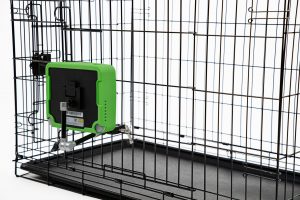Abstract
Application of artificial intelligence (AI) to improve clinical diagnosis is a burgeoning field in human and veterinary medicine. The objective of this prospective, diagnostic accuracy study was to determine the accuracy, sensitivity, and specificity of an AI-based software for diagnosing canine cardiogenic pulmonary edema from thoracic radiographs, using an American College of Veterinary Radiology-certified veterinary radiologist’s interpretation as the reference standard.
Five hundred consecutive canine thoracic radiographs made after-hours by a veterinary Emergency Department were retrieved. A total of 481 of 500 cases were technically analyzable. Based on the radiologist’s assessment, 46 (10.4%) of these 481 dogs were diagnosed with cardiogenic pulmonary edema (CPE+). Of these cases, the AI software designated 42 of 46 as CPE+ and four of 46 as cardiogenic pulmonary edema negative (CPE−). Accuracy, sensitivity, and specificity of the AI-based software compared to radiologist diagnosis were 92.3%, 91.3%, and 92.4%, respectively (positive predictive value, 56%; negative predictive value, 99%). Findings supported using AI software screening for thoracic radiographs of dogs with suspected cardiogenic pulmonary edema to assist with short-term decision-making when a radiologist is unavailable.
Eunbee Kim,Anthony J. Fischetti,Pratheev Sreetharan,Joel G. Weltman,Philip R. FoxFirst published: 19 January 2022 https://doi.org/10.1111/vru.13062
Previous presentation or publication disclosure: : The content of this paper has not been previously published, in full or in abstract form, nor has it been presented at a scientific meeting or congress.






